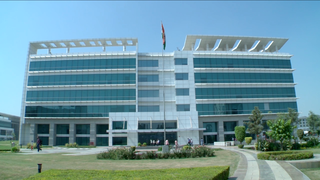Offshoring is the relocation of a business process from one country to another—typically an operational process, such as manufacturing, or supporting processes, such as accounting. Typically this refers to a company business, although state governments may also employ offshoring. More recently, technical and administrative services have been offshored.

HCL Technologies Limited is an Indian multinational technology company, headquartered in Noida, Uttar Pradesh, India. It is a subsidiary of HCL Enterprise. Originally a research and development division of HCL, it emerged as an independent company in 1991 when HCL ventured into the software services business.
Knowledge process outsourcing (KPO) describes the outsourcing of core information-related business activities which are competitively important or form an integral part of a company's value chain. KPO requires advanced analytical and technical skills as well as a high degree of specialist expertise.

One of the most dynamic and fastest growing sectors in the Philippines is the information technology–business process outsourcing (IT-BPO) industry. The industry is composed of eight sub-sectors, namely, knowledge process outsourcing and back offices, animation, call centers, software development, game development, engineering design, and medical transcription. The IT-BPO industry plays a major role in the country's growth and development.
Farmshoring is the shifting of employment from abroad into rural communities across the United States. It is conceptually similar to onshoring which can be defined as "the act of transferring some of a company's recurring interval activities and decision rights to outside providers, as set in a contract". Farmshoring refers to a specific variety of outsourcing where, as well as services being sourced outside of the contracting company, they are outsourced from urban to rural locations.
Business process outsourcing to India refers to the business process outsourcing services in the outsourcing industry in India, catering mainly to Western operations of multinational corporations (MNCs).
On-demand outsourcing is a trend in outsourcing wherein major internal operations processes of a company are being shifted to a provider that is paid for by the number of transactions involved. The business transferring the services pays for the quality, special skills and the competence of the service provider's employees. There has been an expansion of the outsourcing concept to include on-demand outsourcing. This refers to the process undertaken by business managers to adopt an outsourcing policy that ensures that the specific business and supplies including technical manpower are accessed as the need arises. It focuses a business strategy to improve its goods and services and to drive a business towards quality improvement.
In software engineering, offshore custom software development consists in offshoring the software development process in a country where production costs are lower, thus decreasing budget spending.
Global sourcing is the practice of sourcing from the global market for goods and services across geopolitical boundaries. Global sourcing often aims to exploit global efficiencies in the delivery of a product or service. These efficiencies include low cost skilled labor, low cost raw material and other economic factors like tax breaks and low trade tariffs. A large number of Information Technology projects and Services, including IS Applications and Mobile Apps and database services are outsourced globally to countries like Pakistan and India for more economical pricing.

Softtek is a Mexican-based information technology company, operating in North America, Latin America, Europe and Asia. As of 2010 it was the largest private IT vendor in Latin America. Headquartered in Monterrey, Mexico, the company has 12,000 associates in Mexico and abroad. The company offers application software development, testing, security and support; business process outsourcing (BPO); and IT infrastructure management, security and support to more than 400 corporations in more than 20 countries. It also acts as a value added reseller (VAR) for SAP SE, Informatica, Cognos, Business Objects and other software products. The company has trademarked the term "nearshoring" to describe the provision of outsourced services to customers in other countries that are in proximity.

Dalian Software Park, also called DLSP, is an industrial zone, created in 1998 in the western suburbs of Dalian City, Liaoning Province, China, where many of the world's large and medium-sized IT-related companies have set up shop to do software development and information services. It is part of Dalian Hi-Tech Zone in the broader sense. While American and European companies typically have gone to Bangalore and other cities in India because of the English language capability, Japanese companies have gone to Dalian and other cities in China due to the Japanese language capability.
Software Testing Outsourcing is software testing carried out by an independent company or a group of people not directly involved in the process of software development.
Outsource Partners International (OPI) was acquired by EXL in June 2011. The acquisition marked the end of F&A outsourcing of OPI. OPI was a multinational company with headquarters in New York, NY and Los Angeles, CA. It operates from more than a dozen global locations throughout the US, UK, India, Bulgaria, and Malaysia. OPI was formed in 2002 through the acquisition of big four accounting firm's Business Process Outsourcing (BPO) division and itAccounts, a finance and accounting BPO company with an offshore F&A outsourcing facility in Bangalore, India. It offers finance, accounting and tax outsourcing services.
The Offshoring Research Network is an international network of researchers and practitioners studying organizations in their transition to globalizing their business functions, processes and administrative services. The ORN conducts annual surveys tracking global sourcing strategies, drivers, concrete implementations and plans across all business functions and processes.
Banking business process outsourcing or banking BPO is a highly specialized sourcing strategy used by banks and lending institutions to support the business acquisition and account servicing activities associated with the customer lending lifecycle. These specific BPO services are usually offered through multi-year service-level agreements for all or portions of the credit card lending, consumer lending or commercial lending segments of the financial services market. Some larger financial services organizations choose to extend their sourcing strategy to include other outsourced services such as ITO systems and software, human resources outsourcing and benefits services, finance and accounting outsourcing (FAO) services, procurement or training outsourcing.
Backsourcing is the process of bringing previously outsourced jobs back under the roof of the company to be performed internally.
The term robotic automation or robotization refer to the automation of industrial and business processes using robots, of various guises. Robotic automation software refers to a class of software products used in that latter, clerical, context.
Robotic process automation is an emerging form of business process automation technology based on the notion of software robots or artificial intelligence (AI) workers.
Information Technology in Sri Lanka refers to the business process outsourcing, knowledge process outsourcing, software development, IT Services and IT education in Sri Lanka. Sri Lanka is ranked among the top 50 outsourcing destinations by AT Kearney, and Colombo is ranked among "Top 20 Emerging Cities" by Global Services Magazine. The export revenue of this industry grew from USD 213 million in 2007 to an estimated USD 720 million in 2013.
The business process outsourcing industry in China including IT and other outsourcing services for onshore and export markets surpassed 1 trillion yuan in 2016 according to the Ministry of Commerce (MOC).










